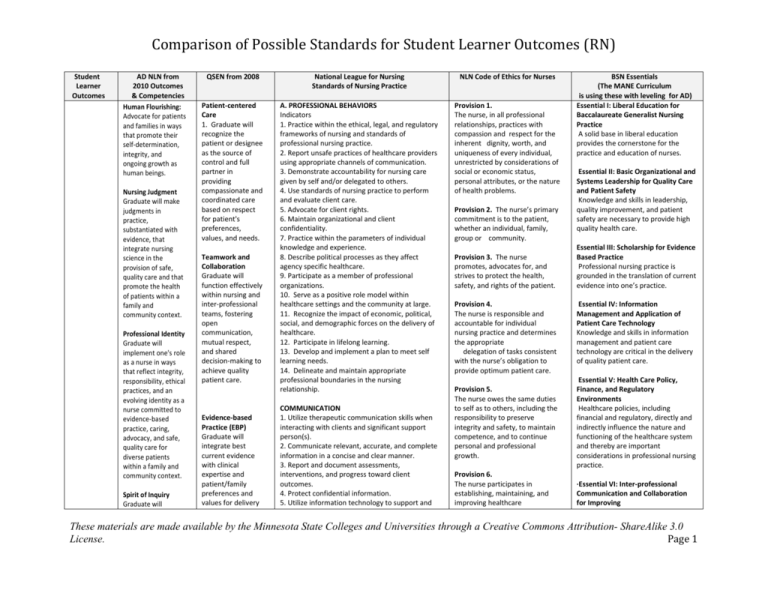Comparison of Possible Standards for Student Learner Outcomes (PN)
advertisement

Comparison of Possible Standards for Student Learner Outcomes (RN) Student Learner Outcomes AD NLN from 2010 Outcomes & Competencies Human Flourishing: Advocate for patients and families in ways that promote their self-determination, integrity, and ongoing growth as human beings. Nursing Judgment Graduate will make judgments in practice, substantiated with evidence, that integrate nursing science in the provision of safe, quality care and that promote the health of patients within a family and community context. Professional Identity Graduate will implement one's role as a nurse in ways that reflect integrity, responsibility, ethical practices, and an evolving identity as a nurse committed to evidence-based practice, caring, advocacy, and safe, quality care for diverse patients within a family and community context. Spirit of Inquiry Graduate will QSEN from 2008 National League for Nursing Standards of Nursing Practice NLN Code of Ethics for Nurses Patient-centered Care 1. Graduate will recognize the patient or designee as the source of control and full partner in providing compassionate and coordinated care based on respect for patient's preferences, values, and needs. A. PROFESSIONAL BEHAVIORS Indicators 1. Practice within the ethical, legal, and regulatory frameworks of nursing and standards of professional nursing practice. 2. Report unsafe practices of healthcare providers using appropriate channels of communication. 3. Demonstrate accountability for nursing care given by self and/or delegated to others. 4. Use standards of nursing practice to perform and evaluate client care. 5. Advocate for client rights. 6. Maintain organizational and client confidentiality. 7. Practice within the parameters of individual knowledge and experience. 8. Describe political processes as they affect agency specific healthcare. 9. Participate as a member of professional organizations. 10. Serve as a positive role model within healthcare settings and the community at large. 11. Recognize the impact of economic, political, social, and demographic forces on the delivery of healthcare. 12. Participate in lifelong learning. 13. Develop and implement a plan to meet self learning needs. 14. Delineate and maintain appropriate professional boundaries in the nursing relationship. Provision 1. The nurse, in all professional relationships, practices with compassion and respect for the inherent dignity, worth, and uniqueness of every individual, unrestricted by considerations of social or economic status, personal attributes, or the nature of health problems. Teamwork and Collaboration Graduate will function effectively within nursing and inter-professional teams, fostering open communication, mutual respect, and shared decision-making to achieve quality patient care. Evidence-based Practice (EBP) Graduate will integrate best current evidence with clinical expertise and patient/family preferences and values for delivery COMMUNICATION 1. Utilize therapeutic communication skills when interacting with clients and significant support person(s). 2. Communicate relevant, accurate, and complete information in a concise and clear manner. 3. Report and document assessments, interventions, and progress toward client outcomes. 4. Protect confidential information. 5. Utilize information technology to support and Provision 2. The nurse’s primary commitment is to the patient, whether an individual, family, group or community. Provision 3. The nurse promotes, advocates for, and strives to protect the health, safety, and rights of the patient. Provision 4. The nurse is responsible and accountable for individual nursing practice and determines the appropriate delegation of tasks consistent with the nurse’s obligation to provide optimum patient care. Provision 5. The nurse owes the same duties to self as to others, including the responsibility to preserve integrity and safety, to maintain competence, and to continue personal and professional growth. Provision 6. The nurse participates in establishing, maintaining, and improving healthcare BSN Essentials (The MANE Curriculum is using these with leveling for AD) Essential I: Liberal Education for Baccalaureate Generalist Nursing Practice A solid base in liberal education provides the cornerstone for the practice and education of nurses. Essential II: Basic Organizational and Systems Leadership for Quality Care and Patient Safety Knowledge and skills in leadership, quality improvement, and patient safety are necessary to provide high quality health care. Essential III: Scholarship for Evidence Based Practice Professional nursing practice is grounded in the translation of current evidence into one’s practice. Essential IV: Information Management and Application of Patient Care Technology Knowledge and skills in information management and patient care technology are critical in the delivery of quality patient care. Essential V: Health Care Policy, Finance, and Regulatory Environments Healthcare policies, including financial and regulatory, directly and indirectly influence the nature and functioning of the healthcare system and thereby are important considerations in professional nursing practice. ·Essential VI: Inter-professional Communication and Collaboration for Improving These materials are made available by the Minnesota State Colleges and Universities through a Creative Commons Attribution- ShareAlike 3.0 License. Page 1 Comparison of Possible Standards for Student Learner Outcomes (RN) examine the evidence that underlies clinical nursing practice to challenge the status quo, question underlying assumptions, and offer new insights to improve the quality of care for patients, families, and communities. of optimal health care. Quality Improvement (QI) Graduate will use data to monitor the outcomes of care processes and use improvement methods to design and test changes to continuously improve the quality and safety of health care systems. Safety Graduate will minimize risk of harm to patients and providers through both system effectiveness and individual performance. Informatics Graduate will use information and technology to communicate, manage knowledge, mitigate error, and support decision making. communicate the planning and provision of client care. ASSESSMENT Indicators 1. Assess the interaction patterns of the individual client or significant support person(s). 2. Assess the impact of development, emotional, cultural, religious, and spiritual influences on the client's health status. 3. Assess the client's health status by completing health history and performing a physical, cognitive, psychosocial, and functional assessment. 4. Assess client and significant support person(s) for learning, strengths, capabilities, barriers, and educational needs. 5. Assess the client's response to actual or potential health problems. 6. Assess the client's response to interventions. 7. Assess the client for changes in health status and identified needs. 8. Assess the client's ability to access available community resources. 9. Assess the environment for facts that may impact the client's health status. 10. Assess the strengths, resources, and needs of clients within the context of their community. CLINICAL DECISION MAKING 1. Make clinical judgments and management decision to ensure accurate and safe care. 2. Analyze and utilize assessment and reassessment data to plan care. 3. Evaluate the effectiveness of care provided in meeting client outcomes. 4. Modify client care as indicated by the evaluation of outcomes. 5. Participate in problem identification and data collection for research, quality continuous improvement processes to meet client outcomes. 6. Use evidence‐based information, collected electronically or through other means to support clinical decision making. environments and conditions of employment conducive to the provision of quality health care and consistent with the values of the profession through individual and collective action. Patient Health Outcomes Communication and collaboration among healthcare professionals are critical to delivering high quality and safe patient care. Provision 7. The nurse participates in the advancement of the profession through contributions to practice, education, administration, and knowledge development. Essential VII: Clinical Prevention and Population Health Health promotion and disease prevention at the individual and population level are necessary to improve population health and are important components of baccalaureate generalist nursing practice. Provision 8. The nurse collaborates with other health professionals and the public in promoting community, national, and international efforts to meet health needs. Provision 9. The profession of nursing, as represented by associations and their members, is responsible for articulating nursing values, for maintaining the integrity of the profession and its practice, and for shaping social policy. ·Essential VIII: Professionalism and Professional Values Professionalism and the inherent values of altruism, autonomy, human dignity, integrity, and social justice are fundamental to the discipline of nursing. Essential IX: Baccalaureate Generalist Nursing Practice The baccalaureate graduate nurse is prepared to practice with patients, including individuals, families, groups, communities, and populations across the lifespan and across the continuum of healthcare environments. The baccalaureate graduate understands and respects the variations of care, the increased complexity, and the increased use of healthcare resources inherent in caring for patients CARING INTERVENTIONS These materials are made available by the Minnesota State Colleges and Universities through a Creative Commons Attribution- ShareAlike 3.0 License. Page 2 Comparison of Possible Standards for Student Learner Outcomes (RN) 1. Protect and promote the client's dignity. 2. Identify and honor the emotional, cultural, religious, and spiritual influences on a client's health. 3. Demonstrate caring behavior towards the client, significant support person(s), and other members of the healthcare team. 4. Provide accurate and safe nursing care in diverse settings. 5. Implement the prescribed care regimen within the legal, ethical, and regulatory framework of nursing practice. 6. Perform nursing skills competently. 7. Provide a safe physical and psychosocial environment for the client. 8. Assist the client and significant support person(s) to cope with and adapt to stressful events and changes in health status. 9. Assist the client to achieve optimum comfort and functioning. 10. Prepare the client and significant support person(s) for intervention, treatment modalities, and self‐care. 11. Support the client and significant support person(s) when making healthcare and end‐of‐life decisions. 12. Adapt care in consideration of the client's values, customs, culture, and/or habits. TEACHING AND LEARNING 1. Develop an individualized teaching plan based on assessed needs. 2. Provide the client and significant support person(s) with the information to make choices regarding health. 3. Teach the client and significant support person(s) the information and skills needed to achieve desired learning outcomes 4. Evaluate the progress of the client and significant support person(s) toward achievement of identified learning outcomes 5. Modify the teaching plan based on evaluation of progress toward meeting identified learning outcomes. 6. Provide assistive personnel with relevant instruction to support achievement of client These materials are made available by the Minnesota State Colleges and Universities through a Creative Commons Attribution- ShareAlike 3.0 License. Page 3 Comparison of Possible Standards for Student Learner Outcomes (RN) outcomes. COLLABORATION 1. Coordinate the decision making process with the client, significant support person(s), and other members of the healthcare team. 2. Work cooperatively with others to achieve client and organizational outcomes. 3. Collaborate with the client, significant support person(s), and other members of the healthcare team to evaluate progress toward achievement of outcomes. 4. Interact creatively and openly with others to solve problems to achieve client goals and outcomes. 5. Collaborate to bring about fair solutions that balance differing needs, values, and motivations for the purpose of achieving positive client outcomes. MANAGING CARE 1. Prioritize client care. 2. Coordinate the implementation of an individualized plan of care for clients and significant support person(s). 3. Facilitate the continuity of care within and across healthcare settings. 4. Delegate aspects of client care to qualified assistive personnel. 5. Supervise and evaluate the activities of assistive personnel. 6. Adapt the provision of client care to changing healthcare settings and management systems. 7. Assist the client and significant support person(s) to access available resources and services. 8. Implement nursing strategies to provide cost efficient care. 9. Demonstrate competence with current technologies. These materials are made available by the Minnesota State Colleges and Universities through a Creative Commons Attribution- ShareAlike 3.0 License. Page 4






